
-16-06-2024-
The Eleventh Sunday in Ordinary Time
Day for Life
Gospel Reading Mark 4: 26 – 34
 vs.26 Jesus said to his disciples:
vs.26 Jesus said to his disciples:
“This is what the kingdom of God is like. A man throws seed on the land.
vs.27 Night and day, while he sleeps, when he is awake, the seed is sprouting and growing; how, he does not know.
vs.28 Of its own accord the land produces first the shoot, then the ear, then the full grain in the ear.
vs.29 And when the crop is ready, he loses no time: he starts to reap because the harvest has come.”
 vs.30 He also said:
vs.30 He also said:
“What can we say the kingdom of God is like?
What parable can we find for it?
vs.31 It is like a mustard seed which at the time of its sowing in the soil is the smallest of all the seeds on earth;
vs.32 yet once it is sown it grows into the biggest shrub of them all and puts out big branches so that the birds of the air can shelter in its shade.”
vs.33 Using many parables like these, he spoke the word to them, so far as they were capable of understanding it.
vs.34 He would not speak to them except in parables, but he explained everything to his disciples when they were alone.
*******************************************
We have four commentators available from whom you may wish to choose . Scroll down to the name of the desired commentator.
Michel DeVerteuil : A Holy Ghost Father, late director of the Centre of Biblical renewal in Trinidad, W.I.
Thomas O’Loughlin: Prof of Hist Theology Uni of Nottingham NG7 2RD
Sean Goan: Studied scripture in Rome, Jerusalem and Chicago
Donal Neary SJ: Editor of The Sacred Heart Messenger and National Director of The Apostlship of Prayer.
****************************************
Michel DeVerteuil
Lectio Divina with the Sunday Gospels
www.columba.ie
Textual Comments
We see Jesus in this passage searching for the right metaphors to illustrate the concept of the kingdom of God, and we are reminded that today we need to find new images to illustrate our own vision of God’s kingdom.
Verses 26b to 30.
 A farmer has sown a tiny seed; he now watches and waits for it to bear fruit. Jesus makes a comparison between the small and negligible start and the extraordinary results. The farmer is in no hurry, he simply waits and lets things happen. Whatever happens will take its own time and he must certainly not try to hurry it.
A farmer has sown a tiny seed; he now watches and waits for it to bear fruit. Jesus makes a comparison between the small and negligible start and the extraordinary results. The farmer is in no hurry, he simply waits and lets things happen. Whatever happens will take its own time and he must certainly not try to hurry it.
He does not try to find out how this happens, but allows things to develop as they will. When the time is ripe the farmer knows that he must get to work. Stay with the slow movement, the first signs of the crop before it is harvest time. Experience the contrast in the last verse when the time comes and everything seems so easy and natural.
We think of parents who worked hard for their children and then one day they saw that it was time to move on and let the children go.
We remember leaders who gave their all to their jobs and then one day knew that the time had come to let others take over.
We think of church pastors who gave themselves to their work and must now allow others to take their place.
Verses 30 to 32.
In this parable Jesus makes a distinction between the small beginning and the final flowering. “At the time of the sowing the mustard seed is the smallest of all the shrubs of the earth.” We remember small acts that we know about and that have led to great results. Acts of love and kindness and loyalty that were done without thinking about what would happen in later years. Looking back, we now see that a great tree grew out of it with plenty of space for people from other classes and tribes to benefit from it. We think also of the many cultures that have found their home in the Bible.
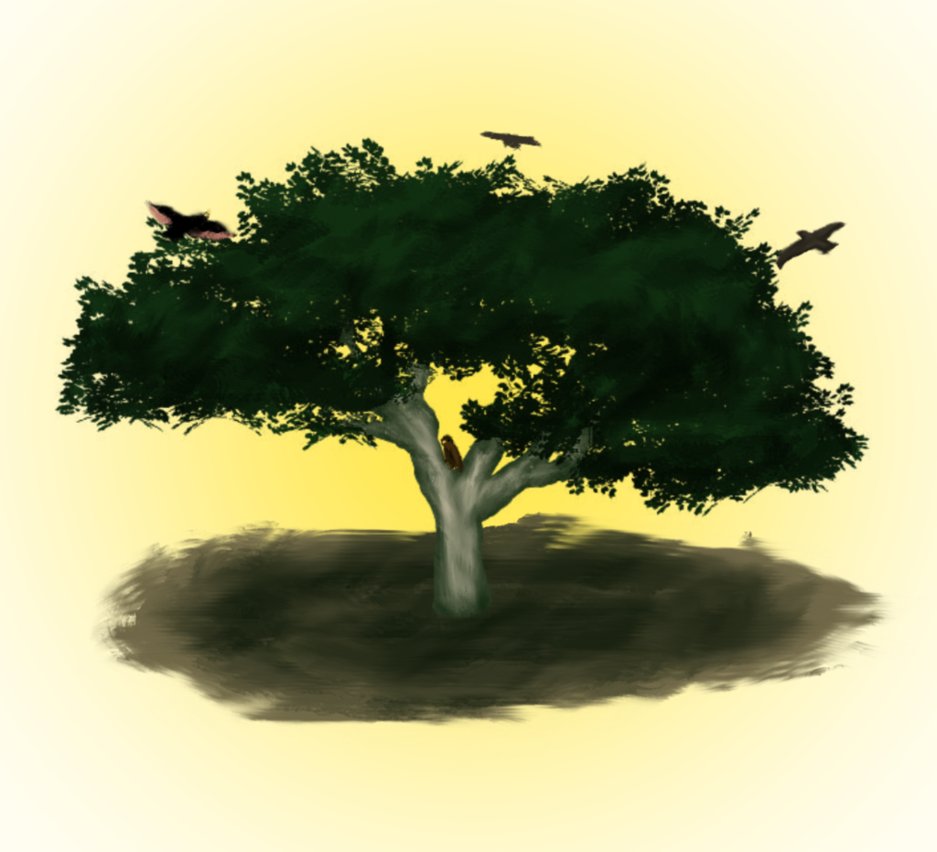 In your meditation you can start from the time of sowing the little seed, a time of enormous potential; or you can start from the time of full growth and remember the small beginnings.
In your meditation you can start from the time of sowing the little seed, a time of enormous potential; or you can start from the time of full growth and remember the small beginnings.
Verses 33 and 34.
You might ask yourself why a great teacher would decide not to speak except in parables.
Prayer Reflection
Lord, we thank you for the times that a bible passage touched us deeply.
When we first read it we knew it was a beautiful word;
so we just received it like a seed sown on the land.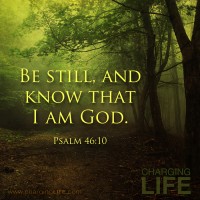
Then we carried on with our daily lives knowing that somehow the words of the passage were there within us weaving in and out of our experience. Gradually we began to catch glimpses of its meaning.
Then, quite unexpectedly, it all came together and we knew that the passage was ours and all we had to do was enjoy it and give you thanks.
Lord, in our modern world there are many things we can do just by pressing a button or turning a switch; Eventually we come to think we can move people like that too. Remind us that helping others to grow is something totally different.
It is rather like throwing a seed on the land; Night and day we sleep, the seed is sprouting and growing, how we do not know.
We see some results and we think that the crop is ready
But we have to wait a little longer.
Only when the harvest has come can we start to reap.
Lord, we pray for those who work the land, that they may reverence it and trust its rhythms remembering that the land has many secrets we do not know,
that it must do things of its own accord, and only when the crop is ready must we start to reap.
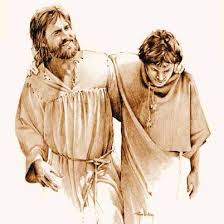 Lord, it is not easy to keep the vision of Jesus alive in the world today.
Lord, it is not easy to keep the vision of Jesus alive in the world today.
The things we preach may sometimes seem irrelevant or trivial:
*love your enemies,
*put the poor first in your calculations,
*practice modesty.
*Jesus is always there with us
Yet we know that we must keep preaching these things because if that tiny seed continues to be sown one day it will become the biggest shrub in the whole world,
it will put out big branches and the birds of all the air will shelter in its shade.
Lord, our leaders like to stand over us and hand down instructions.
But you are not like that.
You speak your word in parables,
in bible passages,
in things that happen to us, in people. We cannot get to the bottom of them, but you give us time.
We cannot get to the bottom of them, but you give us time.
Because you only teach as far as we are capable of understanding.
You open the door of faith gently for us.
Then when the time comes we understand the parable so clearly, and with so much joy.
is as if you had taken us aside as your own special pupils and explained everything to us.
Lord, help us to relate to other as you relate to us.
*************************************
Thomas O’Loughlin
Liturgical Resources for the Year of Matthew
www.columba.ie
Introduction to the Celebration (An Alternative Approach)
Every Sunday we introduce the celebration by saying how people are welcome to the Lord’s banquet, made one in Christ, made brothers and sisters in baptism, and members of the church and of the family of God. This is all true as a set of abstract statements about what we believe about ourselves. However, that is not how it feels and in every celebration the first interaction is at the level of feeling: if we do not feel welcome, then no matter what happens, we feel rejected and that sense of rejection is a fact of human living. If we are to talk about banquets and welcome, then perhaps the first thing is for people to welcome one another, shake hands, and introduce themselves.
This notion of introducing oneself is so important psychologically that at meetings where everyone really already knows one another, it is often a good thing to go around and for each to give her/ his name, say a word of self-introduction, and tell others why they are there. The Eucharist is intended to be intimate in two ways: first, it is a meal of sisters and brothers with the Lord (and family meals are, by definition, intimate); and second, it is to be the centre of our religious lives for the week, and anything that is at the centre of our spirituality is also, by definition, intimate.
So rather than give an introduction, say something like this:
We are gathered here at the Lord’s banquet as his sisters and brothers, so it is appropriate that we should introduce ourselves to each other. Let’s do that now.
Homily Notes
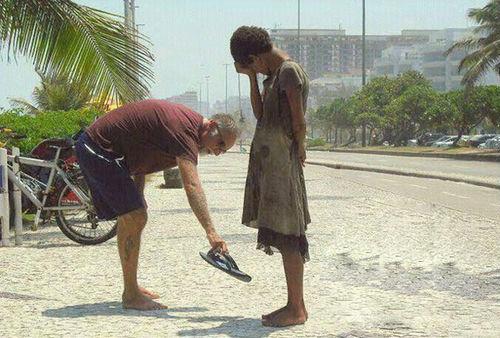 1. ‘Think global, act local‘ is the wise motto of the ecological movement: have the big picture, but actually make a difference, no matter how small, in the right direction. However, the approach is one that is far older than the ecological movement: it is the basic notion we find in Jesus’s teaching about the kingdom. And we see it laid out in today’s gospel: the kingdom is not like the spread of a great empire, it is like tiny seeds scattered here and there. Where does one find it: in vast systems and worldwide schemes? No, rather it is discovered in little things. It is more like a tiny plant than some mighty building. But if it is given time, then the kingdom grows and spreads.
1. ‘Think global, act local‘ is the wise motto of the ecological movement: have the big picture, but actually make a difference, no matter how small, in the right direction. However, the approach is one that is far older than the ecological movement: it is the basic notion we find in Jesus’s teaching about the kingdom. And we see it laid out in today’s gospel: the kingdom is not like the spread of a great empire, it is like tiny seeds scattered here and there. Where does one find it: in vast systems and worldwide schemes? No, rather it is discovered in little things. It is more like a tiny plant than some mighty building. But if it is given time, then the kingdom grows and spreads.
 2. But ‘thinking global, acting local‘ is far harder to put into effect than we like to think. It always seems easier to lay the blame far away in some vast system and it seems very easy to decry our little efforts — in recycling for instance — as not really making a difference.
2. But ‘thinking global, acting local‘ is far harder to put into effect than we like to think. It always seems easier to lay the blame far away in some vast system and it seems very easy to decry our little efforts — in recycling for instance — as not really making a difference.
In the same way, thinking in terms of God’s vast plan but then loving one’s neighbour is far harder than it appears. One can give up because the plan does appears to be off-track, or because the little acts of forgiveness and love seem to make no difference to the world. Indeed, there is always a body of people who see such little actions as really no more than a delusion to distract us from ‘real’ action.
3. In the face of these difficulties and objections, we have to remind ourselves of three aspects of the activity of building the kingdom.
First, the building of the kingdom is nothing less than bringing God’s love closer to creation. It is not the equivalent of recruiting converts or seeking out adherents to our way of doing things. The kingdom happens when it happens:
whenever someone looks at the world afresh, has new joy,
rejoices in beauty, or is encouraged to seek the good.
This intimate scale of the kingdom is proportionate to the scale of the deeds we are called to perform every day. If we cannot communicate love in little things, then we will not succeed in bigger things.
Second, each of us is called to carry out the activities of building the kingdom as part of a community, this community, this church. We are not just a bundle of individuals who happen to share a view of the universe; we are one people bonded together as the body of Christ. We engage in all these little things knowing that all of those we can call brothers and sisters can work in the same way, we can encourage one another, support one another, and comfort one another along an often arduous path.
Third, we are people who are called to: live by faith, act with love, and
walk with hope.
Hope is living with the ‘not yet,‘ the apparent incompleteness of what we do, the energy to get up again after we have confronted frustration.
 4. ‘Think global, act local‘ (or as we might rephrase it into more religious terms:
4. ‘Think global, act local‘ (or as we might rephrase it into more religious terms:
‘Think God, love neighbour‘) also fits into the basic plan of salvation. We seek to build the kingdom of the Father — and we pray for its coming. We do this in union with the Son — we act as the body of Christ. We press on in hope which is an effect of the Holy Spirit living within us —and the Spirit enlightens and enlivens us.
5. ‘Think global, act local‘ has become one of the valuable slogans for many groups. We Christians must also make this slogan our own: it can help us link the values of the kingdom to the practical actions our human situations demand, and it can give concrete expression to one of the pressing urgencies of discipleship.
***************************************************
Sean Goan
Let the Reader Understand
www.columba.ie
Gospel Notes
While St Mark places great emphasis on Jesus’ role as a teacher and frequently uses this word to describe him, we are not given much detail about the content of his teaching. One exception to that is in chapter 4 where we hear a series of Jesus’ parables of the kingdom. All the gospels agree that the parable was the primary means by which he taught the crowds and this was one of the main characteristics of his remarkable ministry. In this text there are two such parables about the kingdom, both centred on the theme of growth.
In the first parable, the kingdom is likened to the situation that unfolds when someone sows seed in the ground. The seed grows independently of him, he knows not how, until the time of the harvest. Jesus wants his hearers to understand that as surely as the seed grows so too does the work of the kingdom happen. It is not up to us — it is a gift of God.
The following parable says something similar, using language that echoes the words of Ezekiel from the first reading. The mustard seed is the tiniest of all but the shrub that issues from it is the greatest of all. So the kingdom, from insignificant beginnings, will grow to give shade to all who come to shelter in its branches.
Reflection
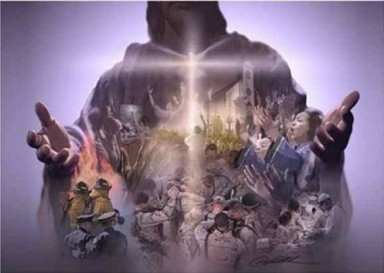 The unique message of Jesus is summed up by his use of the phrase ‘kingdom of God‘ and his unique way of speaking about it was the parable. No doubt Jesus could have written a book or given a series of dogmas and rules, but he chose rather to tell short stories by way of illustration. The kingdom he speaks of is not the afterlife but an expression of how God wants the world to be.
The unique message of Jesus is summed up by his use of the phrase ‘kingdom of God‘ and his unique way of speaking about it was the parable. No doubt Jesus could have written a book or given a series of dogmas and rules, but he chose rather to tell short stories by way of illustration. The kingdom he speaks of is not the afterlife but an expression of how God wants the world to be.
So the parables of the kingdom deal with God’s will for the world and how his grace is at work around us. As such, they offer both comfort and challenge. Today’s parables stress that we must not fret or worry but rather trust that the kingdom will come because God wants it to. They are an invitation to take time to consider how the plan of God unfolds around us in ways that are both surprising and sure.
********************************************
Donal Neary SJ
Gospel Reflections
www.messenger.ie/bookshop/
The Ordinary Jesus
Very often we notice the he ordinariness of Jesus. No big discourse on the kingdom of God. He just looks around him and says it’s like seeds growing and you can’t see them growing.
People knew what he was talking about – seeds growing down in the ground and you can do little about it! You just wait. They had little of the modern quick ways even of sowing. All life was slow and that’s often the way.
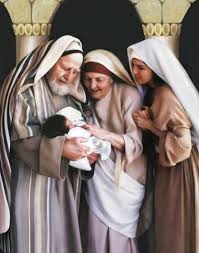 Like tiny beginnings of a baby. All through life some of the best things are under our eyes and we do not see them. Coming to death there is a slow journey often and it’s like growth is happening under the ground. We are being grown by God always if only we would let him do it.
Like tiny beginnings of a baby. All through life some of the best things are under our eyes and we do not see them. Coming to death there is a slow journey often and it’s like growth is happening under the ground. We are being grown by God always if only we would let him do it.
And how we help others grow. You may not know the faith that grows in your children. Faith is different for all of us in practice and specifics. Or the way children are taught to love and it comes out in the next generation: seeing love in a marriage and learning from example to forgive, to live in peace with each other. Seeds are sown and grow – how to love and forgive, how to share with our neighbour, how to face death. When we remember our dead, what comes to mind is what they taught us about life.
A lot of the best in life is ‘w a i t i n g‘.
Important moments come at God’s time. So much of life is on trust.
Have a look this week at something small
that will grow big, and be amazed!
Heart of God, heart of Jesus, we place our trust in you.
